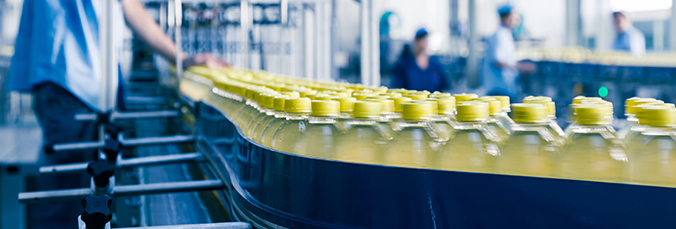
Standardizing Quality in Food & Beverage
Today’s food and beverage consumers value product quality and consistency more than ever before. With elevated expectations and a cornucopia of competitive products to choose from, consumers have forced food and beverage companies to make quality a primary operational focus. And yet, with highly distributed supply chains and growing product volume and variation, managing food and beverage quality has never been so complex.
The Challenges
When it comes to managing and upholding quality, today’s food and beverage manufacturers face many challenges, some of which include:
Documenting Quality, from Field to Fork
For any food item, quality comes down to the integrity of each and every individual ingredient and step in farming and production processes. And yet, in many food and beverage operations, quality control is limited to certain field or factory processes. Managing quality from end-to-end requires that food and beverage companies build a record of quality for every good produced—from raw ingredients, to in-process goods, finished goods, and beyond.
Upholding Quality Across Suppliers & Partners
Even when a producer has comprehensive quality control systems in place, other ingredient suppliers and partners can introduce quality pitfalls. Decentralized manufacturing models and local ingredient sourcing add to this challenge, as food and beverage producers struggle to institute quality controls in the farms and facilities of other suppliers. Addressing quality holistically requires cross-stakeholder traceability, with no blind spots.
Tracking Quality for Each & All Items
Quality is critical for each food and beverage item, but it is equally critical for all items. A key challenge for today’s food and beverage companies is ensuring consistent quality practices are upheld across myriad farms, fields, facilities, production lines, product lines, and shifts. This requires scalable quality management solutions that go beyond random sampling to implement homogenized quality controls for every item and ingredient across the entire supply chain, and notify key stakeholders of quality pitfalls in real time.
Extending Existing Quality Management Systems
While many food and beverage operations have a standard Quality Management System (QMS) in place, the majority of these systems are solely focused on upholding compliance standards like those put forth by the FDA—thus overlooking the critical focus on food and beverage quality that is required to satisfy today’s consumers. In order to transform quality into a true differentiator, food and beverage companies must commit to extending the QMS with ingredient-level traceability that goes above and beyond compliance.
Giving Consumers a Taste of Quality
In today’s quality-conscious food and beverage landscape, it’s not enough to uphold quality commitment internally. Producers must communicate their systematic commitment to quality to the end consumer, whose appetite for transparency demands answers about field and factory practices, item freshness, quality of ingredients, and more. In order to answer important questions like these, food and beverage companies must extend traceability to the end consumer, serving up relevant data to affirm the practices and ingredients in every good.

The Solution
For nearly a century, Ashton Potter has served complex and compliance-driven businesses around the world. Today, we own the entire food and beverage supply chain security process—ranging from the tamper-proof label, to the forensic traceability technology, to the data management system—and leverage partnerships with our Gold Integration Partners to cost-effectively augment and extend existing enterprise systems and processes.
Forensic Traceability for Comprehensive Quality
At Ashton Potter, we support comprehensive quality control in food and beverage through the use of tamper-proof labeling solutions and ProLinc™ forensic traceability technology, which together enable food and beverage companies to uphold quality standards throughout every stage of the farming and production process—whether in the field of a supplier, on the factory floor, in the warehouse, or on store shelves. Highly scalable to billions of records, Ashton Potter empowers global food and beverage companies to transform quality into a strategic differentiator by providing granular traceability on a global scale.
Upholding Quality, One Product at a Time
ProLinc™ builds a unique record of quality for every food or beverage item produced, housing it in a secure, Blockchain-enabled database. With a single scan, approved stakeholders can access highly detailed records that verify each item’s quality, consistency, and freshness. In aggregate, these valuable insights lay the groundwork for continual quality improvement initiatives while also radically simplifying the task of documenting compliance with applicable FDA standards and regulations.
Integration Services & Process Optimization
As a proven partner serving food and beverage operations of all sizes, Ashton Potter augments its technology and labeling solutions with a suite of services that streamline implementation, optimize operational processes, and accelerate time-to-ROI. Working with its network of skilled integration partners, Ashton Potter provides end-to-end project management, process design, on-site and remote training services, and technology integration to its food and beverage customers.
By working seamlessly with existing enterprise resource planning and quality control systems, farm and factory equipment, and business intelligence tools, ProLinc contextualizes product insights with other data sources and makes this information actionable throughout the enterprise.

The Results
By implementing the global traceability needed to advance quality control efforts in the food and beverage supply chain, ProLinc delivers measurable value, including:
- More comprehensive quality management through forensic traceability that monitors quality practices throughout the food and beverage lifecycle—from field, to factory, to fork.
- Better control over quality throughout the food and beverage supply chain, supported by cross-stakeholder traceability that can be extended to other ingredient suppliers and partners.
- High quality data records for individual products and in aggregate, providing a foundation for data-driven quality improvement initiatives.
- Lower costs of quality and compliance through automated documentation and seamless integration with existing quality management and ERP systems.
- Higher customer satisfaction, achieved by enabling end users to access key information about ingredients, quality, and freshness with a single scan.